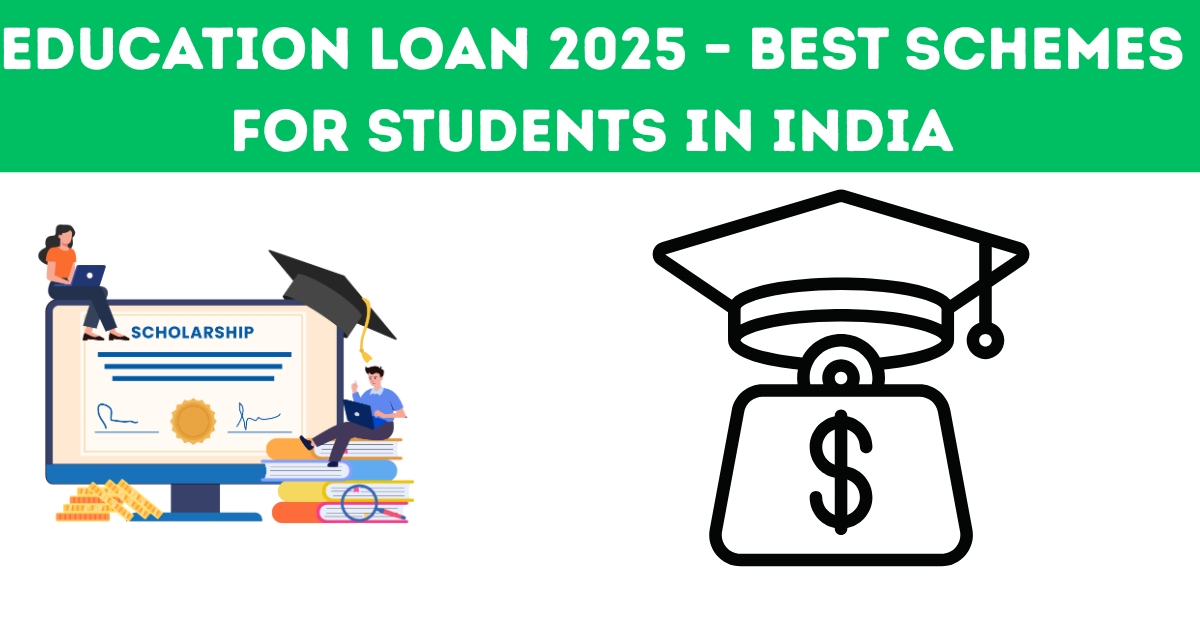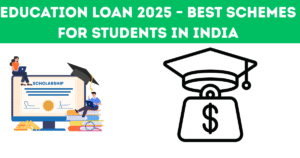Education is the foundation of a successful career, and in 2025, higher studies have become more important than ever. With rising tuition fees in India and abroad, many families look towards education loans to support their children’s academic dreams. An education loan allows students to pursue undergraduate, postgraduate, and professional courses without financial stress.
Indian banks and NBFCs are offering student-friendly loan schemes with low interest rates, flexible repayment options, and moratorium periods. The government has also introduced several subsidy schemes to make education loans more affordable for economically weaker sections.
In this guide, we will explain the best education loan schemes in India for 2025, eligibility criteria, interest rates, repayment process, and tips to get faster approval.
What is an Education Loan?
An education loan is a financial product that helps students fund higher education expenses such as tuition fees, hostel charges, books, travel, and other academic costs. Unlike personal loans, education loans come with:
- Lower interest rates compared to unsecured loans
- Moratorium period (no repayment during study period + 6–12 months)
- Tax benefits under Section 80E of the Income Tax Act
- Coverage of multiple expenses beyond tuition fees
Why Education Loans are Important in 2025
- Rising tuition costs: Engineering, MBA, and medical courses in India can cost ₹5–20 Lakhs, while overseas education may cost ₹20–50 Lakhs.
- Financial independence: Students don’t need to depend entirely on parents.
- Skill-based growth: With NEP 2020 reforms, demand for higher studies in India has increased.
- Government subsidies: Special schemes for economically weaker students.
- Global exposure: Loans make studying in top universities abroad accessible.
Key Features of Education Loans in India
- Loan amount: ₹50,000 up to ₹1.5 Crore depending on course and university
- Interest rate: Starting from 8.40% per annum
- Tenure: 5 to 15 years depending on lender
- Security: No collateral required for loans up to ₹7.5 Lakhs (as per IBA norms)
- Repayment: Begins after course completion plus moratorium period
Eligibility Criteria for Education Loan 2025
Eligibility differs for Indian and international education loans, but general criteria include:
- Student must be an Indian citizen
- Age: 18–35 years for most banks
- Admission must be confirmed in a recognized Indian or foreign institution
- For loans above ₹7.5 Lakhs, collateral or co-applicant may be required
- Co-applicant (parent/guardian) with stable income is necessary
Two-Column Box: Indian vs Abroad Education Loan
| Education Loan for India | Education Loan for Abroad |
|---|---|
| Covers tuition, hostel, books | Covers tuition, travel, living cost, insurance |
| Loan amount up to ₹50 Lakhs | Loan amount up to ₹1.5 Crore |
| Interest rates starting 8.40% | Interest rates slightly higher (9%–12%) |
| No collateral up to ₹7.5 Lakhs | Collateral required for higher amounts |
Documents Required for Education Loan
- Admission letter from the university or college
- Fee structure from institution
- KYC documents (Aadhaar, PAN, Passport)
- Income proof of co-applicant (salary slips, ITR, bank statement)
- Academic records (10th, 12th, graduation certificates)
- Collateral documents (if required for higher loan amount)
Best Education Loan Schemes in India 2025
Here are some top banks and their education loan offerings for 2025:
| Bank / NBFC | Loan Amount | Interest Rate (per annum) | Tenure |
|---|---|---|---|
| SBI Student Loan | Up to ₹1.5 Crore | 8.50% onwards | Up to 15 years |
| HDFC Credila | Up to ₹1 Crore | 9.00% onwards | Up to 15 years |
| ICICI Bank | Up to ₹1 Crore | 9.20% onwards | Up to 10 years |
| Axis Bank | Up to ₹75 Lakhs | 9.50% onwards | Up to 15 years |
| Canara Bank | Up to ₹40 Lakhs | 8.40% onwards | Up to 15 years |
| Bank of Baroda | Up to ₹80 Lakhs | 8.60% onwards | Up to 15 years |
| Punjab National Bank | Up to ₹50 Lakhs | 8.75% onwards | Up to 15 years |
Government Education Loan Schemes 2025
Apart from banks, the Indian government also runs subsidy schemes for students:
- Central Scheme of Interest Subsidy (CSIS) – Full interest subsidy during study period for students from economically weaker sections (annual family income ≤ ₹4.5 Lakhs).
- Padho Pardesh Scheme – Subsidy for minority community students pursuing higher studies abroad.
- Dr. Ambedkar Central Sector Scheme – For OBC and EWS category students studying abroad.
- Vidya Lakshmi Portal – Single-window platform for students to apply for multiple loan schemes from different banks.
Two-Column Box: Bank Loan vs Government Subsidy
| Bank Loan Features | Government Subsidy Features |
|---|---|
| Interest starts during study period | Full interest subsidy during moratorium |
| Collateral may be required | No collateral for subsidy benefit |
| Covers tuition + hostel | Covers interest portion for eligible students |
Interest Rate Trends in 2025
In 2025, interest rates on education loans remain competitive. Public sector banks usually offer lower rates compared to private banks. For example:
- Public banks: 8.40%–9.00%
- Private banks: 9.20%–12.00%
- NBFCs: 10.00%–14.00% depending on profile
Tip: Always compare interest rate + processing fee before finalizing a lender.
Moratorium Period – What You Need to Know
A moratorium period is the time when students are not required to repay the loan. Most banks provide:
- Course duration + 6 months to 1 year as moratorium
- Simple interest may be charged during this time
- EMI repayment starts only after moratorium ends
This helps students focus on studies without worrying about repayment during college years.
Tax Benefits on Education Loan
Under Section 80E of the Income Tax Act, the interest paid on education loans is fully tax-deductible for up to 8 years. This benefit is available to the student or co-applicant repaying the loan.
Benefits of Education Loan in 2025
- Financial support for higher education in India and abroad
- Easy repayment options with tenure up to 15 years
- Moratorium period provides breathing space
- Tax benefits on interest paid
- Builds credit history for students
Challenges to Keep in Mind
- Collateral required for large loan amounts
- Higher rates for private and NBFC loans
- Delay in subsidy approval under government schemes
- Repayment burden if student is unable to secure a job quickly
Tips to Get Quick Education Loan Approval
- Maintain good academic records for better chances
- Choose reputed institutions (banks prefer recognized universities)
- Ensure co-applicant has stable income and credit score
- Apply through Vidya Lakshmi Portal for multiple options
- Compare interest rates and processing fees before applying
Internal Linking Suggestions
👉 You may also like:
- Car Loan Guide 2025 – Eligibility, EMI & Interest Rates Explained
- Top 10 Banks Offering Lowest Interest Rate Personal Loans in 2025
- How to Apply for a Home Loan Online – Step by Step Guide
Frequently Asked Questions
Q1. What is the maximum loan amount for studying abroad?
Banks offer up to ₹1.5 Crore depending on the institution and country.
Q2. Do all education loans require collateral?
No, loans up to ₹7.5 Lakhs usually do not require collateral. Higher amounts need security.
Q3. What is the repayment period for education loans?
Most banks allow 10–15 years for repayment.
Q4. Is there any subsidy scheme for weaker section students?
Yes, CSIS provides full interest subsidy during the moratorium for students with family income below ₹4.5 Lakhs.
Q5. Do NBFCs provide better education loans?
NBFCs provide flexible options but usually at higher interest rates compared to public banks.
Q6. Can I claim tax deduction for education loan?
Yes, interest paid is eligible for deduction under Section 80E for up to 8 years.
Final Thoughts
Education loans in 2025 have become more accessible, flexible, and student-friendly. With multiple schemes from banks and government subsidies, financing higher studies is no longer an impossible dream. Students must carefully compare lenders, understand repayment obligations, and check subsidy eligibility before choosing the right loan.
Whether you are planning to study in India or pursue higher education abroad, the right education loan can open the doors to a brighter future. A smartly chosen loan not only funds your education but also builds financial discipline and independence for years to come.







